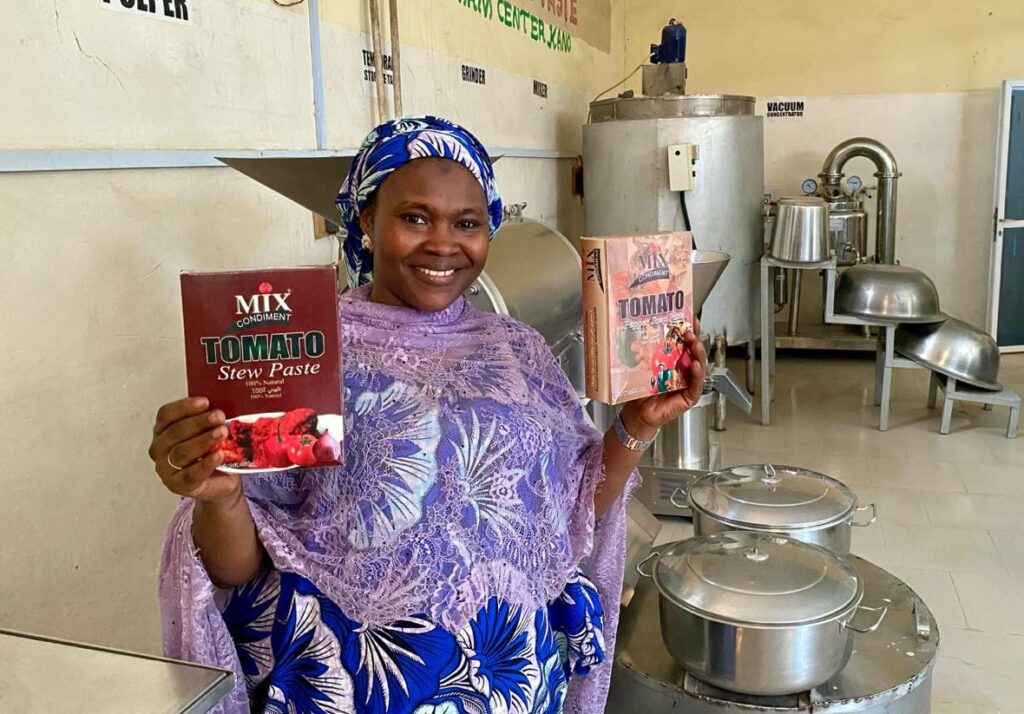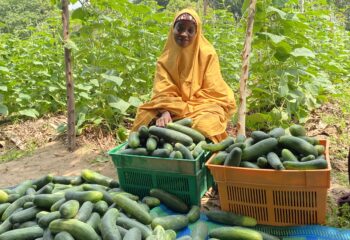
For Aminat Sani, a 35-year-old mother of four from Kano State, Nigeria, entrepreneurship began in the kitchen. While preparing meals for her family, Aminat often made tomato paste, a staple in local soups.
Neighbors who tasted the product always asked for more, and soon, demand outgrew what she could supply. What started as a simple recipe quickly revealed itself as a business opportunity.
“From my kitchen to a factory, I am now serving my state – creating jobs, benefiting farmers with a guaranteed market, and providing families with nutritious food.”
Aminat Sani
As Aminat explored the tomato value chain, she discovered a striking reality: thousands of tons of fresh tomatoes in her region were being wasted every year due to poor storage and limited processing facilities.
Determined to turn this waste into value, she founded Mix Condiment Paste in 2014 as a registered business after winning a grant that gave her visibility and seed capital. With years of steady growth, the enterprise was formally upgraded to a limited liability company in 2021.
In 2022, HortiNigeria invited Aminat to collaborate with the program – support that proved instrumental for her next stage of growth.
Through this collaboration, she participated in business development training on financial management, record-keeping, and quality standards; product development and food safety sessions; and trade fairs, food fairs, and exhibitions that boosted her product visibility and market connections. She also engaged in networking and stakeholder forums, which helped her build lasting partnerships.
Today, Mix Condiment Paste is more than a food business; it is a market anchor for over 100 farmers from Bichi, Kumbosto, and Dawakin Kudu. They supply her facility with fresh tomatoes, peppers, and onions, which allows them to enjoy stable income streams and reduced post-harvest losses.
With this steady supply, Aminat’s company has scaled impressively. Its facility can process 500 kilograms of fresh tomatoes, peppers, and onions per batch, running two batches daily, and can produce 33.5 tons of paste every month, depending on raw material availability and demand. This not only reduces waste but also creates a guaranteed market for local farmers.
Beyond her supply chain, Aminat has built a growing workforce. Mix Condiment Paste employs 12 people, including production staff, quality control specialists, and administrative personnel.
“From my kitchen to a factory, I am now serving my state – creating jobs, benefiting farmers with a guaranteed market, and providing families with nutritious food,” Aminat reflected.
Aminat and her team are determined to expand the company’s impact. Plans are underway to increase production capacity, introduce 70 gram sachet packaging for affordability, and establish a solar-powered centralized drying and processing hub to further cut post-harvest losses. The company also aims to scale greenhouse farming for year-round raw material supply and start the formal process to begin exporting.
Through her vision and the collaboration with HortiNigeria, Aminat shows how strengthening small businesses can empower farmers, create markets, and drive transformation across Nigeria’s food systems.
HortiNigeria (2021-2025) is funded by the Embassy of the Kingdom of the Netherlands in Nigeria and implemented by IFDC, together with KIT Institute and East-West Seed Knowledge Transfer Foundation (EWS-KT).





